
Yama is the Hindu deity of death, dharma, the south direction, and the underworld. Belonging to an early stratum of Rigvedic Hindu deities, Yama is said to have been the first mortal who died in the Vedas. By virtue of precedence, he became the ruler of the departed.

Sun Wukong, also known as the Monkey King, is a literary and religious figure best known as one of the main characters in the 16th-century Chinese novel Journey to the West. In the novel, Sun Wukong is a monkey born from a stone who acquires supernatural powers through Taoist practices. After rebelling against heaven, he is imprisoned under a mountain by the Buddha. Five hundred years later, he accompanies the monk Tang Sanzang riding on the White Dragon Horse and two other disciples, Zhu Bajie and Sha Wujing, on a journey to obtain Buddhist sutras from India, known as the West or Western Paradise, where Buddha and his followers dwell.

Ox-Head and Horse-Face are two guardians or types of guardians of the underworld in Chinese mythology. As indicated by their names, both have the bodies of men, but Ox-Head has the head of an ox while Horse-Face has the face of a horse. They are the first beings a dead soul encounters upon entering the underworld; in many stories they directly escort the newly dead to the underworld.

Vaiśravaṇa or Vessavaṇa, is one of the Four Heavenly Kings, and is considered an important figure in Buddhism. He is the god of warfare and usually portrayed as a warrior-king.

Erlang Shen, or simply Erlang, is a god in Chinese folk religion and Daoism, associated with water, justice, warriorhood, hunting, and demon subdual. He is commonly depicted as a young man with a third, truth-seeing eye in the middle of his forehead, wielding a three-pronged spear, and being accompanied by his loyal hunting dog, Xiaotian Quan.

Diyu is the realm of the dead or "hell" in Chinese mythology. It is loosely based on a combination of the Buddhist concept of Naraka, traditional Chinese beliefs about the afterlife, and a variety of popular expansions and reinterpretations of these two traditions. The concept parallels purgatory in certain Christian denomininations.

Meng Po is the goddess of oblivion in Chinese mythology, who serves Meng Po Soup on the Bridge of oblivion or Naihe Bridge. This soup wipes the memory of the person so they can reincarnate into the next life without the burdens of the previous life. She awaits the dead souls at the entrance of the 9th round Fengdu.

Zhong Kui is a Taoist deity in Chinese mythology, traditionally regarded as a vanquisher of ghosts and evil beings. He is depicted as a large man with a big black beard, bulging eyes, and a wrathful expression. Zhong Kui is able to command 80,000 demons to do his bidding and is often associated with the five bats of fortune. Worship and iconography of Zhong Kui later spread to other East Asian countries, and he can also be found in the folklores and mythologies of Korea, Japan, and Vietnam.

Hell money is a modernized form of joss paper printed to resemble legal tender bank notes. The notes are not an official form of recognized currency or legal tender as their sole intended purpose is to be offered as burnt offerings to the deceased as a solution to resolve their assumed monetary problems in the afterlife. This ritual has been practiced by modern Chinese and across East Asia since the late 19th century, and some Wicca-based faiths in recent years have adopted this practice. Early 20th century examples bore resemblance to minor commercial currency of the type issued by businesses across China until the mid-1940s.
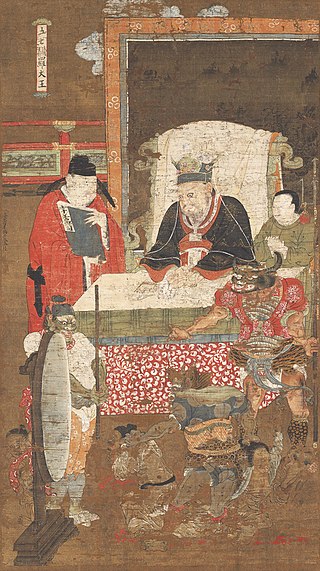
In East Asian and Buddhist mythology, Yama or King Yan-lo/Yan-lo Wang, also known as King Yan/Yan Wang, Grandfatherly King Yan, Lord Yan, and Yan-lo, Son of Heaven, is the King of Hell and a dharmapala said to judge the dead and preside over the Narakas and the cycle of saṃsāra.

Journey to the West is a Chinese television series adapted from the 16th-century novel of the same title. The series was directed and produced by Cheng Lidong and starred Zhenxiang, Victor Chen, Xie Ning and Mou Fengbin in the leading roles. It was first aired on Zhejiang Satellite TV (ZJSTV) in China on 14 February 2010. This version is not to be confused with the 2011 television series of the same title produced by Zhang Jizhong.

Fengdu Ghost City is a large complex of shrines, temples and monasteries dedicated to the afterlife located on the Ming mountain, in Fengdu County, Chongqing municipality, China. It is situated about 170 kilometres (110 mi) downstream from Chongqing on the north bank of the Yangtze River.

Bull Demon King, also translated as the Ox King, also-known by his self-proclaimed title the Great Sage Who Pacifies Heaven, and as Dàliwáng and as Niú Dàli, is a fictional character from the 16th century novel Journey to the West.
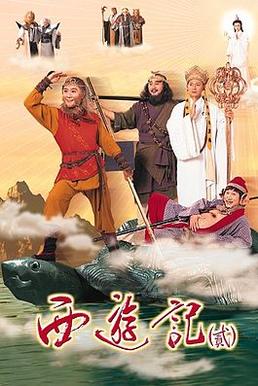
Journey to the West II is a Hong Kong television series adapted from the 16th-century novel Journey to the West. The series was produced by TVB and was first broadcast on TVB Jade in Hong Kong from October to December 1998. It is a sequel to the 1996 television series Journey to the West, also produced by TVB, which covered only the first half of the novel. Benny Chan replaces Dicky Cheung as Sun Wukong in this installment, while the other principal cast members Kwong Wah, Wayne Lai and Evergreen Mak reprise their roles from the previous installment.

Youdu in Chinese mythology is the capital of Hell, or Diyu. Among the various other geographic features believed of Diyu, the capital city has been thought to be named Youdu. It is generally conceived as being similar to a typical Chinese capital city, such as Chang'an, but surrounded with and pervaded with darkness.
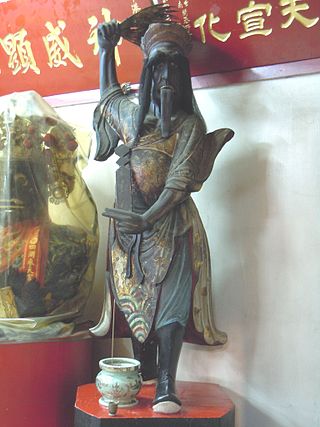
The Heibai Wuchang, or Hak Bak Mo Seong, literally "Black and White Impermanence", are two Deities in Chinese folk religion in charge of escorting the spirits of the dead to the underworld. As their names suggest, they are dressed in black and white respectively. They are subordinates of Yanluo Wang, the Supreme Judge of the Underworld in Chinese mythology, alongside the Ox-Headed and Horse-Faced Hell Guards. They are worshiped as fortune deities and are also worshiped in Cheng Huang Temples in some countries.
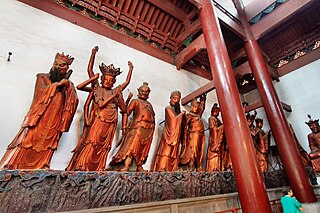
The Twenty-Four Protective Deities or the Twenty-Four Devas, sometimes reduced to the Twenty Protective Deities or the Twenty Devas, are a group of dharmapalas in Chinese Buddhism who are venerated as defenders of the Buddhist dharma. The group consists of devas, naga kings, vajra-holders and other beings, mostly borrowed from Hinduism with some borrowed from Taoism.
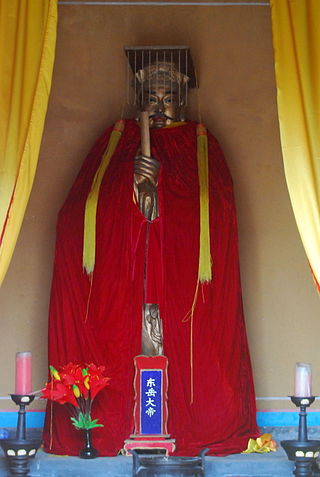
Emperor Dongyue is a Daoist deity of the sacred mountain Mount Tai. He is also believed to be the leader of a large bureaucratic celestial ministry overseeing the maintenance of the Book of Life (生死簿), a register of the due dates on which each and every human soul must be summoned before the Judges of Hell for judgement. Dongyue Dadi is also considered significant in Chinese Buddhism. He is the personification of Cangdi as the "Great Deity of the Eastern Peak" (东岳大帝), which is Mount Tai. As the incarnation of Mount Tai, he is the holy messenger of communication between heaven and the world, and the patron saint of the emperors of all dynasties who was ordered by the sky to govern the world.






















